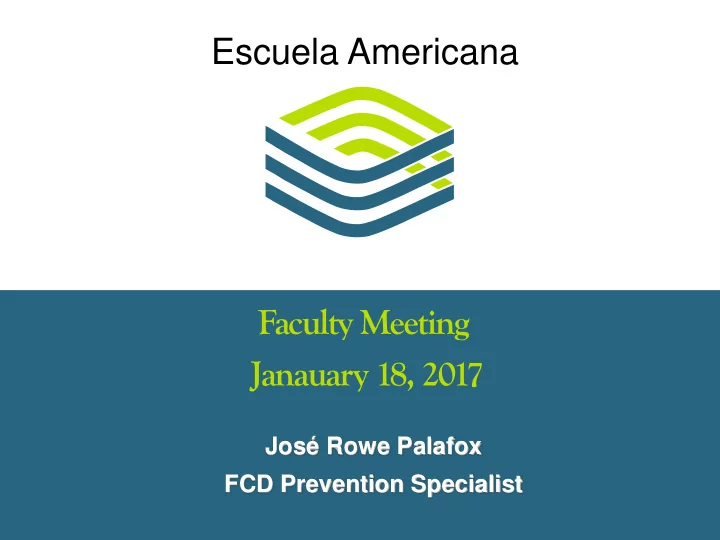

Escuela Americana Faculty Meeting Janauary 18, 2017 José Rowe Palafox FCD Prevention Specialist
FCD Educational Services Private nonprofit organization 40 years of school-based substance abuse prevention 2 million students, 69 countries Prevention is a climate and not a program 2 www.fcd.org
Comprehensive Prevention Planning www.fcd.org 3
Middle School Intensive Student Education Facts and Strengths Building Seminar 1: Addiction Addiction as a disease, risk and protective factors Seminar 2: Alcohol, Tobacco/Nicotine, and Marijuana Basic information, the risks and consequences of use Seminar 3: Facts About Other Drugs More ATM discussion and other questions answered Seminar 4: Solutions and Alternatives How to help a friend, stress management, healthy highs 4
Upper/High School Intensive Student Education Critical Thinking and Skill Development Seminar 1: Use and Culture Interpreting what society says about substances Seminar 2: Use and Community Considering influences of family, friends, school and community on a young person’s substance choices Seminar 3: Use and the Individual — Part I Substances’ effects on the young brain and body Seminar 4: Use and the Individual — Part II Substances’ effects on personal development and identity 5
Risk Factors for Addiction Family History Age of first use Cravings Tolerance Surroundings www.fcd.org 6
How Teen Brain Works Process of synaptic pruning: – Decrease in of grey matter – Increase in white matter – High levels of dopamine – Maturing – Driven emotionally – Primed socially – Risk taking – Pleasure seeking www.fcd.org 7
Human Brain Development www.fcd.org 8
Social Norms People tend to do what they perceive everyone else is doing. What people think everyone else is doing becomes the norm. But… …perceptions are not always accurate. Still… …behaviors occur based on false norms. www.fcd.org 9
Perceptions vs. Reality 4% of all students think “it is cool to get drunk” Yet, 23% of all students assume schoolmates think “it’s cool to get drunk” 6% of 12 th graders think “it is cool to get drunk” Yet, 37% of 12 th graders assume schoolmates think “it is cool to get drunk” 10
School Protective Factors Academic achievement Extracurricular participation Connectivity to trusted adults Opportunities for natural highs A community where non-use is respected, rewarded, and normal Early intervention health systems Infrastructural investment in the social norms approach www.fcd.org 11
Resiliency Adapting well “ Bouncing back ” Keeps kids healthy Prevents substance abuse www.fcd.org 1 2
How is Resiliency Built? Loving adults “ Stress role models ” Age-appropriate communication Behavior control Knowing about support systems Having healthy highs in place www.fcd.org 1 3
The Roles of Healthy Adults in the Lives of Healthy Kids Set, keep and enforce clear and consistent policy Share facts, not fear Practice and role play www.fcd.org 1 4
The Roles of Healthy Adults in the Lives of Healthy Kids Talk about the joys of healthy living Celebrate students ’ healthy decision- making Stress personal responsibility www.fcd.org 1 5
Interventions Discipline? Referral? Correcting?
What Faculty Can Do Role model adult health Be involved in healthy activities, ready to intervene on unhealthy attitudes and behavior Actively express the school ’ s expectations and consequences Know what is going on with: – substance trends – social norms – students in the classroom, hallways, athletic fields, etc. – students when stress is high www.fcd.org 17
Take-Away Points for Faculty All student use equals risk Delayed use prevents later problems The majority of students are making healthy choices Adult role modeling and expectations are vital to a healthy prevention climate www.fcd.org 18
Questions or Comments? www.fcd.org 19
Resources FCD Educational Services www.fcd.org “ FCD: Prevention Works ” National Institute on Drug Abuse http://www.nida.nih.gov www.fcd.org 20
Recommend
More recommend